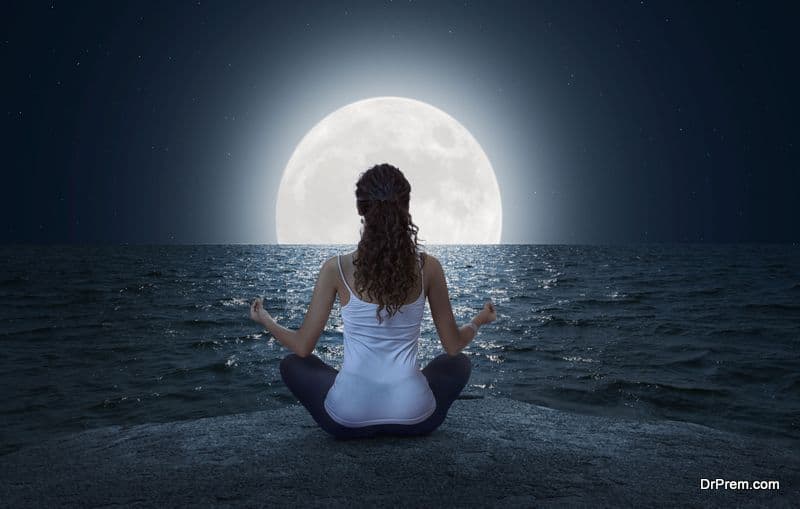According to Dr. Charles Raison (a well reputed American physiatrist and a renowned mental health expert), a lot of practices in the ancient world found throughout different cultures and geographical locations, done for healing and the spiritual reason seem to have an effect in behavioral traits of depression.
How Ancient Spiritual Practices Can Help With Fighting Depression
Six ancient practices that can help with fighting depression in the modern world.
-
How does spending time in nature help?
-
How Heat exposure help as a cure for depression?
-
How Fasting acts as a way to cleanse the mind?
-
How Long-distance help running?
-
How ancient practice of worshiping the sun?
-
How Age-old practice of worshiping the moon?
It is interesting to note how we can take these practices from the old world and apply them to the modern world for our mental and emotional wellbeing. We can repurpose these ancient practices in our lifestyles as a way of fighting depression.
What might also catch the attention is how these ancient spiritual practices that were rehearsed as a way to induce trance and heightened spiritual state of mind are exempted out from the behaviors that were necessary for survival.
Most of these ancient practices that might help with fighting depression have evolved from the strategies of survival. What is truly fascinating is that most of these activities were practiced across cultures and different religions. We need to bring back ancient wellbeing inputs and integrate in our life so we have a foundation of stability in wellbeing.
Six ancient practices that can help with fighting depression in the modern world.
1) How does spending time in nature help?
Humans are remarkably flexible animals. We have evolved in a process of thousands of years and adapted our behavior according to the circumstances. We tend to experience a lot of species-typical behavior and a lot of species-typical needs from the environment. We have co-evolved with various microorganisms that are essential for maintaining our health.
Let’s call them environmental signals that are needed to heal ourselves in time and space and our behavior. A lot of these signals that are needed for wellbeing have been destroyed in our modern world. We have formed a co-dependency with microorganisms that we have evolved with but these organisms have been destroyed or eradicated in the modern world.
These micro biome and pseudo-commensal organisms (organisms that are not reproducing or residing in us, but maintain a persistent presence through continual, re-introduction via our environment.) are not only important to maintain a healthy gut and immune system but are also important in fighting depression.
Due to over sterilization of our environment we have lost contact with these organisms that are important for our health. Spending time in nature can re-introduce them into our bodies which can have numerous beneficial effects. Other than that, numerous studies have found that ecotherapy which basically involves doing various activities in the natural environment has shown to help with mild to moderate depression.
2) How Heat exposure help as a cure for depression?
So many cultures from around the world use phasic exposure to high heat for spiritual and healing purposes. It is important to note that by heat exposure we mean staying in high heat temperatures in a periodic manner as opposed to living in naturally hot weather.
Pre-Hispanic indigenous people from Mesoamerica used temazcal(originated from Nahuatl word which means house of heat or hot baths) or sweat lodges as a way to heal themselves.
We can use this ancient practice for curing depression.
In 2012, researchers John A. Bargh and IditShalev conducted a study where they found a positive link between taking hot baths and mental wellness. Another study found that inducing whole-body hyperthermia had a significant impact in reducing symptoms of depression (results found on the Hamilton Depression Rating Scale).
Even in Ayurveda, ancient Ayurvedic texts talk about therapeutic hot baths with rose petals, honey, milk and turmeric as a way to restore balance in mind, body, and spirit.
Ancient Greek steam bath called Laconia, the water is generally heated by a fire underneath or by rocks heated in fire and then brought into the bath. These baths were used to relax and unwind and for various other therapeutic purposes. They strongly believed in therapeutic powers of hot water bathing. According to them, soaking oneself in lavender-scented water is a great way to relax and calm the nerves.
3) How fasting acts as a way to cleanse the mind?
Fasting, that is going days without food and liquids, is a way to offer prayers to the divine or is done in order to cleanse one’s body. Almost in all the religions from the world both indigenous and world, fasting has been a key element.
Fasting is practiced by many people as a way to connect to one’s soul. Amongst many ancient practices to cure depression, fasting is one of the least explored methods. Almost all the major world religions be it Hinduism, Christianity, Islam, Jainism, etc., etc. all have set periodic dates where they are asked to practice fasting as a way to get closer to god, and as a way to ask for forgiveness for the sins committed. Fasting has many anti-inflammatory and a positive impact on metabolism. Fasting clears the brain and mind, awakens the senses and also improves your brain functioning.
Dr. Jandial, a neurosurgeon swears by fasting as a way to improve mood and cognitive abilities. Fasting also makes you more mindful of your body and you are more aware of your surroundings due to heightened state of brainpower. Few studies that have been conducted on animals also suggest that fasting can protect against diseases like Parkinson and Alzheimer.
It has been established by many numbers of controlled studies that controlling calorie intake and consuming anti-inflammatory diet can lead to an increase in remission rates and a decrease in peripheral inflammatory signals. The results have also indicated improvement in a range of depressive symptoms—from depressed mood, cognitive difficulties, and irritability. This spiritual ancient practice can work wonders for curing depression.
4) How Long-distance help running?
Many cultures have used rigorous or long-distance running to induce a sort of powerful spiritual state. In many cultures and religions, long-distance running is considered to be an activity that can clear your mind of unwanted thoughts, makes you more spiritual and gives you a feeling of trance (what we call today to be runners high).
Tibetian Buddhists practiced long-distance running. In Buddhism, there is a concept of achieving Buddhahood in one’s lifetime. It is said that the best way to come closer to the mind state of Buddha is running to the point of exhaustion. They have a tradition called Kaihogyo- performed by Tendai Buddhist monks.
The practice involves walking around a route on mount Hiei while offering prayers at shrines and other sacred places. Before performing this ritual, they go through an intensive training for 7 years. The ritual has two versions, one involves running for 100 days and the other involves running for 1000 days. While performing this ritual, monks run for as long as 50 miles a day. This practice is said to be a massive inducer of transcendent states.
In certain tribes from native America, people used long-distance running as a way to overcome a lot of challenges like alcoholism and drug use. Dan Lieberman from Harvard believes that human brains might have evolved because of long-distance running. It is believed that running induces rapid shifts in the autonomic nervous system.
This seems to be a sealant for the mind of enlightenment. As they say, a run a day keeps the depression away. Many doctors, as well as a study published in Harvard medical journal, claim that long-distance running can actually help with regulating parts of the brain that are associated with mood regulation.
5) How ancient practice of worshiping the sun?
Way too many cultures and religions from around the world had various rituals that involved worshiping the sun. In some cultures, it is considered as a deity while others considered it as a powerful force that sustains life on earth. In Hinduism, the practice of worshiping the sun early in the morning while pouring water from a flask and chanting religious mantras is supposed to be a daily ritual.
In the Egyptian culture, the sun was called Ra, one of the most important gods. The summer solstice was practiced throughout cultures including Mithraism, Roman religion, Buddhism, among the Druids of England, the Aztecs of Mexico, the Incas of Peru, and many Native Americans.
In ancient Vedic literature, “Surya namaskar” or sun salutation was practiced as a way to offer prayers and salutation to the almighty sun. It involves a series of mudras that were done in front of the sun. In Persian societies, honoring the rising sun was considered an important part of the culture.
Spending time outside during the sunrise is said to have numerous benefits on health. It has also been linked to maintaining a healthy mental state. Exposure to both sunlight and darkness can trigger the secretion of various hormones in your brain. Exposure to the right amount of sunlight is considered to trigger the release of serotonin, the feel-good hormone.
Serotonin is said to have a mood-boosting effect on the brain. Low levels of serotonin can actually make one sad and depressed. Due to this connection, one of the major cures of depression is light therapy (the light therapy box mimics the natural sunlight). It increases the production of serotonin and decreases the production of melatonin. Sunbathing is also a common practice and a suggested cure for depression.
6) How Age-old practice of worshiping the moon?
Similarly to sun worship, lunar worship is also common across many cultures. Moon worship has a dominant place in ancient spiritual traditions. Many religions and societies from around the world have worshiped the moon in different ways from chanting mantras to breaking fast.
Moon is also a dominant symbol of Islamic culture. In Hindus, there are specific rituals for new moon and full moon days. They generally observe fasts during the full moon and new moon day. They believe that the stage of the lunar cycle has a great effect on an individual’s mood cycle.
According to Ayurveda and recent scientific beliefs, moon bathing can have a calming, cooling and soothing effect on your mind and body. For the female body, worshiping the moon is practiced for ages. It is said to have positive health benefits with respect to female’s fertility. Although there is no research data to support that claim, many believe that the moon can intensify your feelings. Full moon days can make you more sociable while new moon days can make you more irritable.
What is fascinating to note is that many of our ancient rituals are taken out of behaviors that were essential for human evolution and survival. Probably depression is a body’s way of saying that you have wandered too far away. It is probably a calling to come back to your roots. All the modern therapies and much more that we practice as a cure or treatment for depression are too close to ancient rituals that our ancestors practiced as a way to heal or to gain spiritual insights. Re-infusing these rituals into our life with the understanding of modern science and technology can actually work wonders for our physical as well as mental health.















